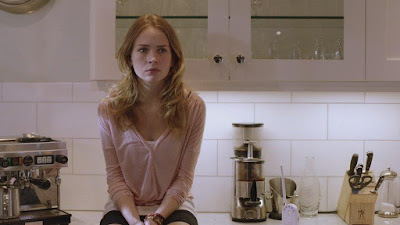Wednesday, May 18, 2016
the female gaze: a triple feature
Strange Days: (1995. dir: Kathryn Bigelow) Bigelow worked her way up in a boy's medium by making boy movies. I love Point Break because it's shameless and exhilarating and because Lori Petty plays the love interest, no conventional beauty, but slim and athletic, like she might really be a great surfer. Near Dark arrived pre-Buffy, pre-Twilight, when vampire films were still boy territory, but this one had a muscular, unsentimental vision, including Jenette Goldstein as a sexual but completely unkittenish badassed vampire-matriarch.
Strange Days is a now-outdated take on virtual reality, and so incorporates the whole gamut of boy-gamer buttons: girl on girl porn, rape snuff, anarchist revolution, violent crime. It's misogynist in that way that Spike Lee films often are: the chicks are all about getting naked and dressing for men, but there are also very strong women to leaven the effect. Angela Bassett gets to play one of those, although she still has to don the obligatory sex-kitten drag for the climactic scenes. (You know that bumper sticker that reads, "Ginger did everything Fred did, only backwards and in high heels"? Nowadays femme-heroes have to do everything Jason Statham does, except in five-inch stilettos and body-clenching micro-minis.) Juliette Lewis, on the other hand, plays an entirely thankless role as a heartless sexbot who only comes to life when she's onstage singing (and I assume Lewis took the role for that, as she obviously has a talent for it).
So that seems to be the way to be the first woman to win a directing Oscar: make your films all aggressively androcentric.
Ask Me Anything: (2014. dir: Allison Burnett) In the first hour you think it’s a vapid, snarky tribute to heartless, mindless, teenaged narcissism, with Britt Robertson spending a lot of time running around in her underwear. In the middle, it begins to morph, and, as it does, you realize it has been heading that way all along. The self-obsessed, sexually addicted girl at its center at last begins to examine her own motives. The ending is both inconclusive and interesting, but all questions, across the board, are left unanswered. Robert Patrick has a talent for making unpleasant characters more palatable, and he does so here as the paternal slob who talks dirty, never moves from the couch, disses wives both present and past, and may or may not hold responsibility for his daughter’s fucked-up-ness. It's a troubling thing that not one of the male characters seems to act with the girl’s best interests in mind. Even the saintly bookseller has a Christian agenda to peddle. In the end, the most obviously self-interested of the men, her professor-lover, comes off best because he's the least hypocritical.
This seems to have been marketed as a sort of teen comedy, which it absolutely is not. By the final frames, it's hard to say what it is. Our unstable heroine has seemed to fade at the edges, slowly, until she vanishes entirely.
Aloft : (2015. dir: Claudia Llosa) Strange and ethereal picture about faith-healing and a parent/child rift of cataclysmic proportion. Because it approaches its strange subjects from odd angles, it is worth watching, and Cillian Murphy as usual never puts a foot wrong. The feel of it is improvisational and handheld, but Jennifer Connolly, in a dream role, seems to equate serious acting with avoiding everyone's eyes, including ours, the camera. In fact, Melanie Laurent (as the journalist who searches out the grown son to reunite him with his estranged mater) does some of the same, so I'm wondering if this director takes a sidelong approach to realism which results in a tamping-down of vitality in her actors.
The best moment, my favorite moment, is at the end, when Connolly makes the bold choice Not To Cry. It's perfect, and indicative of a wonderful strength.
Subscribe to:
Post Comments (Atom)













No comments:
Post a Comment